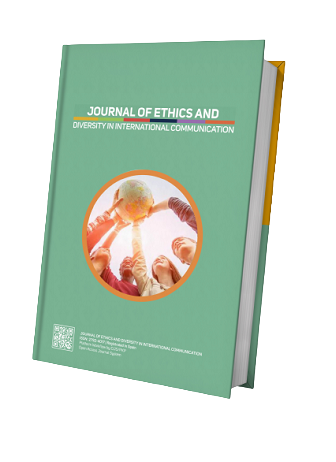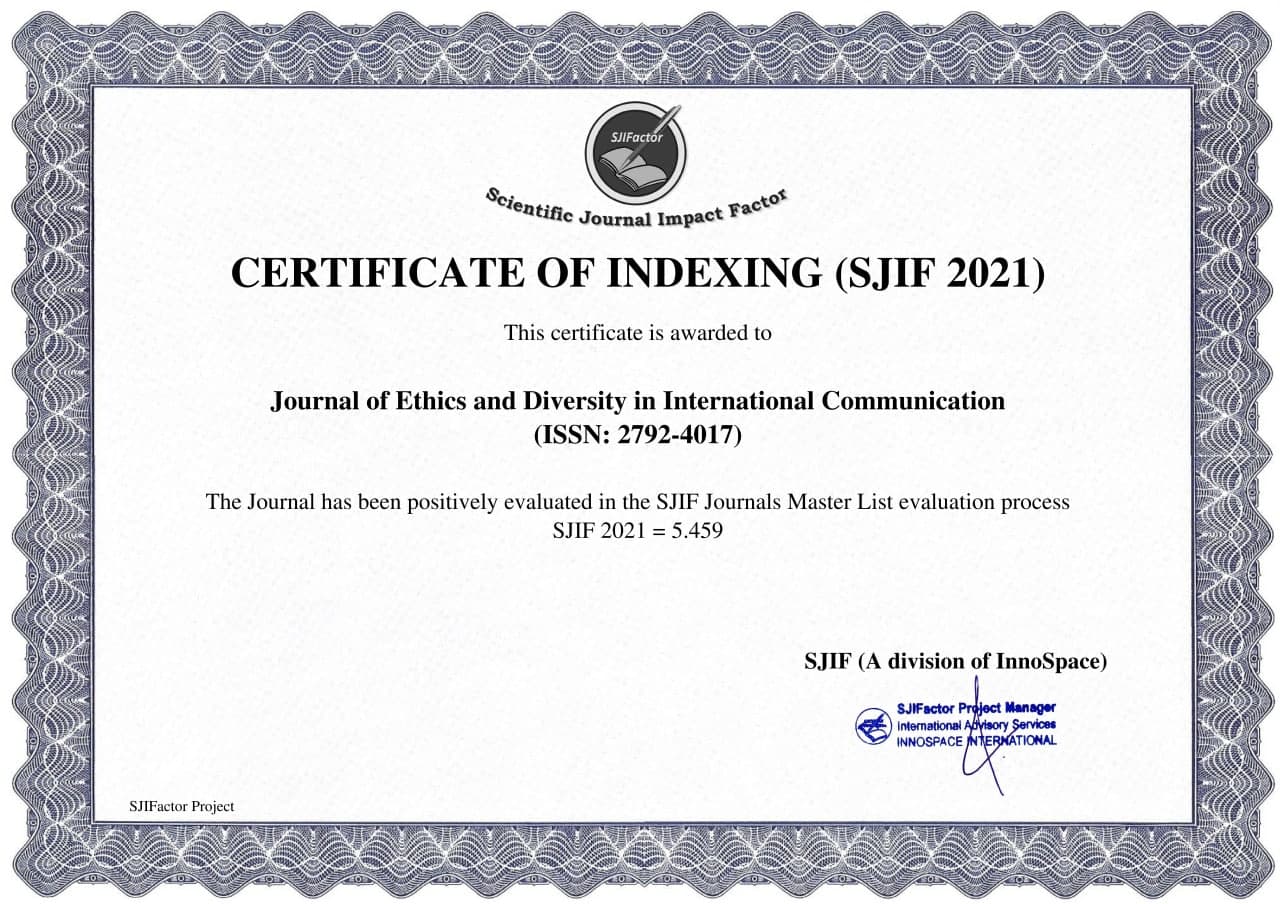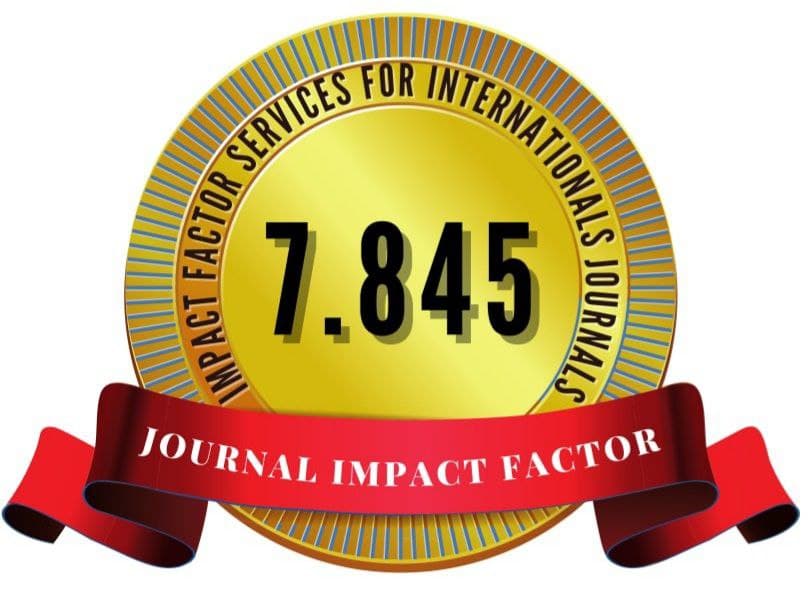The Connection of Speaking and Listening Skills in the Process of Teaching and Learning Foreign Languages
Abstract
The development of world countries at the global level is inextricably linked with economic, social, political, and cultural awareness. Uzbekistan also realizes this fact and enacts legislations to facilitate foreign language learning among its citizens. This study aims to explore the theoretical and practical aspects of developing speaking and listening skills, as well as the challenges and benefits of integrating them in Uzbekistani classrooms. The study reviews various sources, such as books, articles, reports, and websites, that address the topic from different perspectives and contexts. The study concludes that speaking and listening skills are interrelated and mutually supportive, and that they play a crucial role in enhancing communicative competence and intercultural awareness among foreign language learners. The study also provides some recommendations for teachers and learners on how to foster these skills effectively and efficiently.
References
W. Wang, “Translanguaging in a Chinese–English bilingual education programme: a university-classroom ethnography,” International Journal of Bilingual Education and Bilingualism, vol. 22, no. 3. pp. 322–337, 2019. doi: 10.1080/13670050.2018.1526254.
S. Preece, “Elite bilingual identities in higher education in the Anglophone world: the stratification of linguistic diversity and reproduction of socio-economic inequalities in the multilingual student population,” Journal of Multilingual and Multicultural Development, vol. 40, no. 5. pp. 404–420, 2019. doi: 10.1080/01434632.2018.1543692.
D. K. Palmer, “Bilingualism, Biliteracy, Biculturalism, and Critical Consciousness for All: Proposing a Fourth Fundamental Goal for Two-Way Dual Language Education,” Theory into Practice, vol. 58, no. 2. pp. 121–133, 2019. doi: 10.1080/00405841.2019.1569376.
K. Menken, “Translanguaging in English-Only Schools: From Pedagogy to Stance in the Disruption of Monolingual Policies and Practices,” TESOL Quarterly, vol. 53, no. 3. pp. 741–767, 2019. doi: 10.1002/tesq.513.
President of the Republic of Uzbekistan, Xalq ta’limini boshqarish tizimini takomillashtirish bo‘yicha qo‘shimcha chora-tadbirlar to‘g‘risida. 2018. Accessed: Feb. 06, 2024. [Online]. Available: https://lex.uz/docs/3893427?otherlang=4
Noprival, “The motivations of learning foreign languages: A descriptive case study of polyglots,” Qualitative Report, vol. 26, no. 12. pp. 3823–3833, 2021. doi: 10.46743/2160-3715/2021.4619.
Cabinet of Uzbekistan, Xorijiy tillarni o‘rganishni ommalashtirishni samarali tashkil etish chora-tadbirlari to‘g‘risida. 2022. Accessed: Feb. 06, 2024. [Online]. Available: https://lex.uz/docs/5431847?otherlang=4
kun.uz, “Uzbekistan to establish Agency for Promoting Foreign Language Learning,” kun.uz. Accessed: Feb. 06, 2024. [Online]. Available: https://kun.uz/en/news/2021/05/20/uzbekistan-to-establish-agency-for-promoting-foreign-language-learning
N. N. Normatovna, “Problems in Enhancing Oral Speech Skills of English as a Foreign Language and Chances to Eliminate Them,” Int. J. Integr. Educ., vol. 5, no. 12, pp. 96–99, Dec. 2022, doi: 10.17605/ijie.v5i12.3762.
G. H. Bakiyeva, “Exploring English pronunciation teaching in Uzbekistan,” Int. J. Sci. Technol. Res., vol. 9, no. 2, pp. 1208–1219, 2020.
E. Trumbull, “The Ongoing Quest for Culturally-Responsive Assessment for Indigenous Students in the U.S.,” Front. Educ., vol. 4, 2019, doi: 10.3389/feduc.2019.00040.
A. L. Reschly, “Handbook of Research on Student Engagement: Second Edition,” Handb. Res. Stud. Engagem. Second Ed., pp. 1–670, 2022, doi: 10.1007/978-3-031-07853-8.
A. J. Liddicoat, “Language-in-education policy in the Central Asian republics of Kyrgyzstan, Tajikistan, Turkmenistan, and Uzbekistan,” Routledge Int. Handb. Lang. Educ. Policy Asia, pp. 452–470, 2019, doi: 10.4324/9781315666235.
J. An, “Students’ beliefs about the role of interaction for science learning and language learning in EMI science classes: Evidence from high schools in China,” Linguist. Educ., vol. 65, 2021, doi: 10.1016/j.linged.2021.100972.
C. Colas, “Language as a cognitive tool to imagine goals in curiosity-driven exploration,” Adv. Neural Inf. Process. Syst., vol. 2020, 2020.
P. Chatterjee, “Digital Story-Telling: A Methodology of Web Based Learning of Teaching of Folklore Studies,” International Conference on Advanced Communication Technology, ICACT, vol. 2019. pp. 573–578, 2019. doi: 10.23919/ICACT.2019.8702047.
F. Han, “The effect of digital game-based language learning mobile application on the development of complexity, accuracy, and fluency in foreign language monologic oral production among Chinese learners of English as a foreign language,” ASCILITE 2017 - Conference Proceedings - 34th International Conference of Innovation, Practice and Research in the Use of Educational Technologies in Tertiary Education. pp. 95–99, 2019.
G. Kļava, “The effect of Covid-19 on Livonian language learning pportunities,” Emak. Seltsi Aastaraam., vol. 66, no. 1, pp. 124–138, 2021, doi: 10.3176/ESA66.05.
O. V. Kisel, “Difficulties in Applying a Student-Centered Approach in Modern Russian Higher Education,” Vysshee Obraz. V Ross., vol. 29, no. 8, pp. 95–103, 2020, doi: 10.31992/0869-3617-2020-29-8-9-95-103.
N. A. Katalkina, “The Use of Literary Works for Stimulating Students’ Creativity,” Lect. Notes Netw. Syst., vol. 345, pp. 937–947, 2022, doi: 10.1007/978-3-030-89708-6_75.
Y. T. Akhmedovna, “To develop students’ knowledge, skills and competencies in the organizational and technical aspects of essay,” Acad. Int. Multidiscip. Res. J., vol. 11, no. 2, pp. 914–918, 2021, doi: 10.5958/2249-7137.2021.00435.3.
P. B. Tandika, “Pre-primary teachers’ preparedness in integrating information and communication technology in teaching and learning in Tanzania,” Information and Learning Science, vol. 121, no. 1. pp. 79–94, 2020. doi: 10.1108/ILS-01-2019-0009.
M. Sellberg, “–A cross-sectional study of clinical learning environments across four undergraduate programs using the undergraduate clinical education environment measure,” BMC Medical Education, vol. 21, no. 1. 2021. doi: 10.1186/s12909-021-02687-8.
E. G. Ko, “Promoting English Learning in Secondary Schools: Design-Based Research to Develop a Mobile Application for Collaborative Learning,” Asia-Pacific Education Researcher, vol. 31, no. 3. pp. 307–319, 2022. doi: 10.1007/s40299-021-00562-0.
L. M. Dorner, “Equity for Students Learning English in Dual Language Bilingual Education: Persistent Challenges and Promising Practices,” TESOL Quarterly, vol. 54, no. 3. pp. 535–547, 2020. doi: 10.1002/tesq.599.








